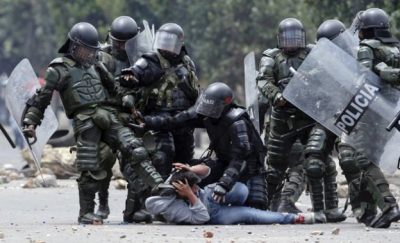Colombia’s Partnership with NATO Allows It to Breach Human Rights Without Condemnation

All Global Research articles can be read in 51 languages by activating the “Translate Website” drop down menu on the top banner of our home page (Desktop version).
Visit and follow us on Instagram at @crg_globalresearch.
***
Since Joe Biden’s ascendency into the White House on January 20, he has emphasised that the U.S.’ foreign policy will be guided by human rights, even if it means calling out traditional allies. However, Washington is completely silent about the repression of anti-government demonstrations in Colombia, its closest ally in Latin America.
At the end of the May 28 meeting with his Colombian counterpart Marta Lucía Ramírez, U.S. Secretary of State Antony Blinken even expressed “his concern and condolences for the loss of life during recent protests in Colombia and reiterated the unquestionable right of citizens to protest peacefully.” However, on the same day as Blinken’s statement, 13 deaths and hundreds of injuries were reported in Cali, the third city of Colombia. This occurred following demonstrations which degenerated into clashes between protestors and security forces.
People with bulletproof vests and guns shot at demonstrators in front of the police. The situation degenerated so badly that the military arrived to aid police to suppress protests against a new tax reform which will send many in the Middle Class into poverty. According to an official count, there are at least 59 deaths, including two police officers. There are also at least 2,300 injuries and 123 missing since protests began at the end of April. Human Rights Watch reported there were a total of 63 deaths as of May 27.
Yet, the U.S. is highly unlikely to denounce Colombia for this gross treatment of civilian protestors.
Colombia is Washington’s main ally in Latin America. For this reason, it is unsurprising that Colombia is one of the countries with the most security and military cooperation agreements with the U.S. These agreements mostly revolve around drug trafficking, civil conflict and destabilising neighbouring Venezuela.
In addition, Colombia is the only Latin American country to gain recognition as a global partner of NATO. This was achieved in 2018 only because of Washington’s insistence. This agreement allows Colombia to associate with the activities of the Atlanticist alliance, including maritime security and countering terrorism and organized crime. In exchange, Colombia receives military material and equipment from the U.S.
This agreement does not constitute a blank check for decisionmakers in the Colombian capital of Bogota. The bilateral relationship between Washington and Bogota proved to be more fluid under the aegis of Donald Trump, who at the time was being influenced by warhawk John Bolton, his National Security Adviser. However, as Colombia’s right-wing President Iván Duque is not completely ideologically aligned with Biden, many speculate that Washington wants to maintain some distance with the current administration in Bogota.
In order to take the opposite view of his predecessor Trump, who successfully used conservative and quasi-patriotic rhetoric to ascend to power, Biden wants to restore the image of American leadership internationally that was destroyed over the past two decades, particularly following the invasions of Afghanistan and Iraq, through terrorizing journalists and whistleblowers like Julian Assange. Such an approach involves the promotion of human rights and reviving the idea of Western-styled democracy against so-called authoritarianism – hence Biden’s willingness to take any opportunity to demonize Russia and China as they do not conform to Western liberal standards.
Under this banner of human rights, the Biden administration raised its tone vis-à-vis China, with Blinken accusing the Asian Giant of genocide against the Muslim Uighur minority in Xinjiang province. In addition, Blinken also attempts to incriminate Moscow over the Navalny affair. The American President even promised to discuss human rights issues during his scheduled June 16 meeting in Geneva with his Russian counterpart Putin.
The unrest and fierce crackdown that ensued in Colombia came at the worse time for U.S. diplomacy as it does not correspond to the global image that Biden is attempting to project. The U.S. is faced with a dilemma as it appears that the fundamentals of bilateral relations in Biden’s view, based around human rights, is overlooked in the case of Colombia.
It is likely that Washington is discreetly encouraging Duque to settle the crisis without additional repressive excess. That being said, even if Colombia is to continue its violent repression against protestors, it is unlikely to deeply affect its relationship with the U.S. as the South American country is now an indispensable ally and enacts all of Washington’s demands, even to the detriment of its relations with its neighbours, like Venezuela.
*
Note to readers: Please click the share buttons above or below. Follow us on Instagram, @crg_globalresearch. Forward this article to your email lists. Crosspost on your blog site, internet forums. etc.
Paul Antonopoulos is an independent geopolitical analyst.
Featured image is from InfoBrics

